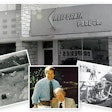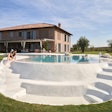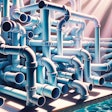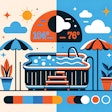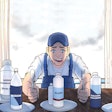I recently read an AQUA article titled "Does A College Education Matter In The Pool and Spa Industry?" The discussion drew a long thread of responses, most of which in one way or another prompt the question: How far can someone excel in the water industry without some form of continuing or collegiate tutoring?
The online comments to the article were almost uniformly testaments to how education allowed the writers to advance themselves. They were all just one side of the story, though. If we wrote the script for someone in the pool and spa industry with no formal education, what would he or she look like and how far could they go in our modern world?
Many years ago, I would say there was no way that someone could get far by simply checking out books from the library, but with today’s access to digital information, it might be possible. There are examples of great minds that pushed that envelope with an undying drive. One was Phillip di Giacomo, arguably the industry’s greatest artificial rock expert and one of my own mentors for a time. He accomplished pinnacles of innovation and success with only an 8th grade education, which took place in the early part of last century. Yet he read textbooks and literary compositions at the rate of about one a week for fifty to sixty years; he used informal study to became one of the most widely educated people I’ve ever met.
For me, education is an equation similar to thermodynamics or electrical current: areas of high pressure or potential migrating to areas of low pressure. Education is a process of information flowing from people who have it to those who don't, a dynamic exchange that can unfold in vast number of ways.
When considering what my formal education provided me compared to what I’ve learned from practical experience, it’s learning techniques in particular that come to mind. For example, how to apply a scientific model over my own assumptions or desires, systematic teamwork in coming to a design solution and basically learning how to learn.
Practical experience in the water industry will definitely elevate one’s skills when designing or building within the current framework of the industry, but it would never teach you how to explore outside that bubble to look for inspiration in uncharted realms of the world. Looking to your peers for inspiration typically only allows for very small levels of improvement over time.
When I was asked almost 10 years ago to teach a 20-hour architectural and art history class to pool builders, I felt it could never happen. Well, it did happen and I was able to provide a glimpse into our world’s vast water (and non-water) architecture, which has broadened the design base from which water professionals pull when seeking design touchstones.
In addition, earning a college education requires students to take a slew of classes they would never select on their own. I labored through chemistry, English, trigonometry, human studies and even golf. In hindsight, this all made me a more well-rounded human who can have an intelligent conversation with a client, associate or new friend. Left to my own devices, I would never have taken a chemistry class. This is a fact. Did it help greatly? No, but I have a fundamental understanding of how our world works, which contributes to my overall knowledge base for everything I do.
I contend that with the limited education currently available in this profession (and its narrow focus on topics like equipment repair and plaster problems) coupled with overall low enrollment rates, an industry-focused approach to education might lower the abilities and intellectual growth of those who pursue it.
Yet formal education is often dismissed, or even scoffed at, by some who claim that learned information is nothing without a real world-application. Therefore, taking a class on design, color theory or the history of water and never learning how to use it effectively in the water industry will not elevate the profession.
I would argue that both types of learning, educational and experiential, are necessary. There’s a need to synthesize higher education and its practical application to allow for real growth — one without the other is somewhat moot.
In June, I wrote about the "Aqua Architect," my philosophy about how pool builders should see themselves — as "aquatic designers" rather than "pool builders." When considering the role of the Aqua Architect in the realm of this discussion, I came to a conclusion: the Aqua Architect would never be as great without education. He or she would also not be great without applying that education. I design mechanical systems with knowledge I gained from college, but I know how hydraulics work in the pool environment thanks to more than 25 years of experience in the industry. One compliments that other.
The bottom line: Go get an education and a job at the same time. I did.





























